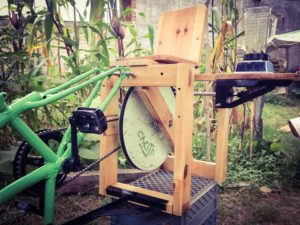The Most Important Question to Create Eco-Friendly Technological Leaps
Stumbling across this article on bicycle-powered-everythings (bicimaquinas) in Guatemala—grain mills, water pumps, nut-shellers, blenders, and more—I’m reminded once again of the key question to ask if you want to spark innovation while keeping an eco-friendly focus on using fewer resources.
Too often, we focus on the tool: asking questions like “how do I get a new tractor?” But what is a tool? It’s a means of accomplishing a task! So the real focus should be on the task: “How can I get this done?” Asking “how can I get harvestable plants” might lead to plowing with draft animals—or to no-till farming techniques.
Green entrepreneurs (or frugal ones) refine that question. It morphs into “How can I accomplish this with the fewest resources?” Money and time are resources. So are raw materials, energy, water, plant seeds, animals, and so forth.
The people at Maya Pedal, the organization profiled in the bicimaquinaarticle, understood this. They looked around and realized there were a lot of junk bikes out there that could still do plenty of useful work, just not as transportation. They’ve come up with 19 different models so far.
Bicycle technology is cheap, accessible, understandable, and versatile. In fact, my latest book Guerrilla Marketing to Heal the World mentions a number of creative bike technology uses, even including a bike-powered trash hauling company. I also know of a fitness center that harnesses the energy of their bike-pumping clients to light the room.
We can ask this question in many situations—and it creates abundance. Asking “how can I power my electronic devices easily and cheaply without negative environmental consequences” might lead to developing something like the amazing Blue Freedom frisbee-sized hydroelectric plant (no dam required).

Back when laser printers were retailing for $7000 and I had only a dot matrix, I asked myself how I could offer laser quality to my clients without spending that kind of money. That led me first to rent time on a nearby laser printer for a dollar a page, and later—when I spotted a remaindered model for $2500—to organize a co-op of four local business owners who chipped in $700 each to buy the printer and a sturdy stand for that very heavy machine. Since I organized the co-op, the printer lived in my office.
Amory Lovins, founder of Rocky Mountain Institute, asked himself how to build a really energy-efficient house that could fund the energy improvements out of capital savings. All the way back in 1983, he built a near-net-zero-energy luxury home that didn’t need a furnace or an air conditioner (in the snowbelt outside Aspen, Colorado, where the biggest industry is skiing). I have a detailed study of Lovins’ work in Guerrilla Marketing to Heal the World, by the way—including the energy retrofit of the Empire State Building that saves $4.4 million per year in that building’s energy bills.
What’s the second question you might ask? How has nature already accomplished this task? But that’s an exploration for another time.
Thanks Heath Dannis, @dannis_heath for sharing the great story about bicimaquinas.

